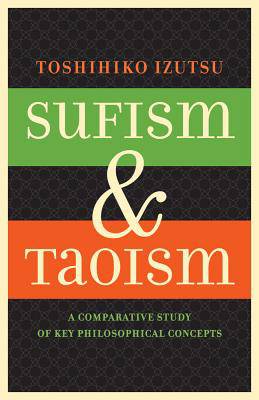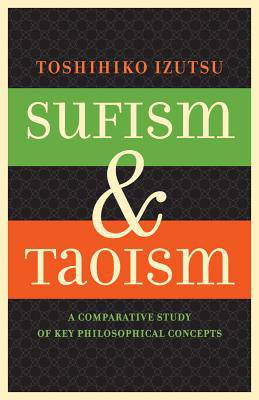
- Retrait gratuit dans votre magasin Club
- 7.000.000 titres dans notre catalogue
- Payer en toute sécurité
- Toujours un magasin près de chez vous
- Retrait gratuit dans votre magasin Club
- 7.000.0000 titres dans notre catalogue
- Payer en toute sécurité
- Toujours un magasin près de chez vous
Sufism and Taoism
A Comparative Study of Key Philosophical Concepts
Toshihiko Izutsu
Livre broché | Anglais
46,95 €
+ 93 points
Description
In this deeply learned work, Toshihiko Izutsu compares the metaphysical and mystical thought-systems of Sufism and Taoism and discovers that, although historically unrelated, the two share features and patterns which prove fruitful for a transhistorical dialogue. His original and suggestive approach opens new doors in the study of comparative philosophy and mysticism.
Izutsu begins with Ibn 'Arabi, analyzing and isolating the major ontological concepts of this most challenging of Islamic thinkers. Then, in the second part of the book, Izutsu turns his attention to an analysis of parallel concepts of two great Taoist thinkers, Lao-tzu and Chuang-tzu. Only after laying bare the fundamental structure of each world view does Izutsu embark, in the final section of the book, upon a comparative analysis. Only thus, he argues, can he be sure to avoid easy and superficial comparisons. Izutsu maintains that both the Sufi and Taoist world views are based on two pivots--the Absolute Man and the Perfect Man--with a whole system of oncological thought being developed between these two pivots. Izutsu discusses similarities in these ontological systems and advances the hypothesis that certain patterns of mystical and metaphysical thought may be shared even by systems with no apparent historical connection.
This second edition of Sufism and Taoism is the first published in the United States. The original edition, published in English and in Japan, was prized by the few English-speaking scholars who knew of it as a model in the field of comparative philosophy. Making available in English much new material on both sides of its comparison, Sufism and Taoism richly fulfills Izutsu's motivating desire "to open a new vista in the domain of comparative philosophy."
Izutsu begins with Ibn 'Arabi, analyzing and isolating the major ontological concepts of this most challenging of Islamic thinkers. Then, in the second part of the book, Izutsu turns his attention to an analysis of parallel concepts of two great Taoist thinkers, Lao-tzu and Chuang-tzu. Only after laying bare the fundamental structure of each world view does Izutsu embark, in the final section of the book, upon a comparative analysis. Only thus, he argues, can he be sure to avoid easy and superficial comparisons. Izutsu maintains that both the Sufi and Taoist world views are based on two pivots--the Absolute Man and the Perfect Man--with a whole system of oncological thought being developed between these two pivots. Izutsu discusses similarities in these ontological systems and advances the hypothesis that certain patterns of mystical and metaphysical thought may be shared even by systems with no apparent historical connection.
This second edition of Sufism and Taoism is the first published in the United States. The original edition, published in English and in Japan, was prized by the few English-speaking scholars who knew of it as a model in the field of comparative philosophy. Making available in English much new material on both sides of its comparison, Sufism and Taoism richly fulfills Izutsu's motivating desire "to open a new vista in the domain of comparative philosophy."
Spécifications
Parties prenantes
- Auteur(s) :
- Editeur:
Contenu
- Nombre de pages :
- 502
- Langue:
- Anglais
Caractéristiques
- EAN:
- 9780520292475
- Date de parution :
- 15-07-16
- Format:
- Livre broché
- Format numérique:
- Trade paperback (VS)
- Dimensions :
- 140 mm x 213 mm
- Poids :
- 589 g

Les avis
Nous publions uniquement les avis qui respectent les conditions requises. Consultez nos conditions pour les avis.






